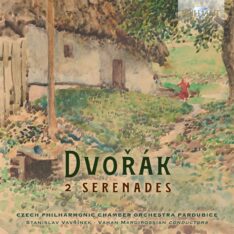Dvoraks zwei Serenaden sind auf dieser CD vereint. Zunächst erklingt jene für Streicher, die Stanislav Vavrinek sehr entspannt und melodienselig, in den tänzerischen Sätzen auch elegant schwungvoll gestaltet, sehr transparent auch, so dass das Streichergeflecht wunderbar zum Ausdruck kommt. Die Tempi sind moderat und erlauben eine ruhige Betrachtung von Dvoraks Zufriedenheit mit seiner Situation, nachdem er ein Staatsstipendium bekommen hatte.
Prächtig gelungen ist auch die Bläserserenade, die auch Cello und Kontrabass verwendet und etwa dreieinhalb Jahre später entstand als die Streicherserenade. Ihre farbenfrohe Melodik blüht in einem sehr vollen und fast symphonischen Klang brillant auf. Auch Mardirossian forciert nichts in den drei ersten Sätzen. Im Finale, Allegro molto ist sein Dirigat vital und der Klang prägnant und, ja, lustig. Zwischen beiden Sonaten steht, gefühlvoll und kontemplativ dargeboten, das Stück Waldesruh.
Two serenades by Dvorak are combined on this CD. The first is the one for strings, which Stanislav Vavrinek plays in a very relaxed and melodious way, elegantly swinging in the dance-like movements and very transparent, so that the string texture is wonderfully expressed. The tempi are moderate and allow for a calm contemplation of the music characterized by Dvorak’s satisfaction with his situation after receiving a state scholarship.
The Wind Serenade, which also uses cello and double bass and was composed about three and a half years later than the String Serenade, is also splendidly successful. Its colorful melody blossoms brilliantly in a very full, almost symphonic sound. Mardirossian does not force anything in the first three movements. In the finale, Allegro molto, his conducting is vital, the sound concise and, yes, fun. Between the two sonatas is Waldesruh, played with sensitivity and contemplation.




















